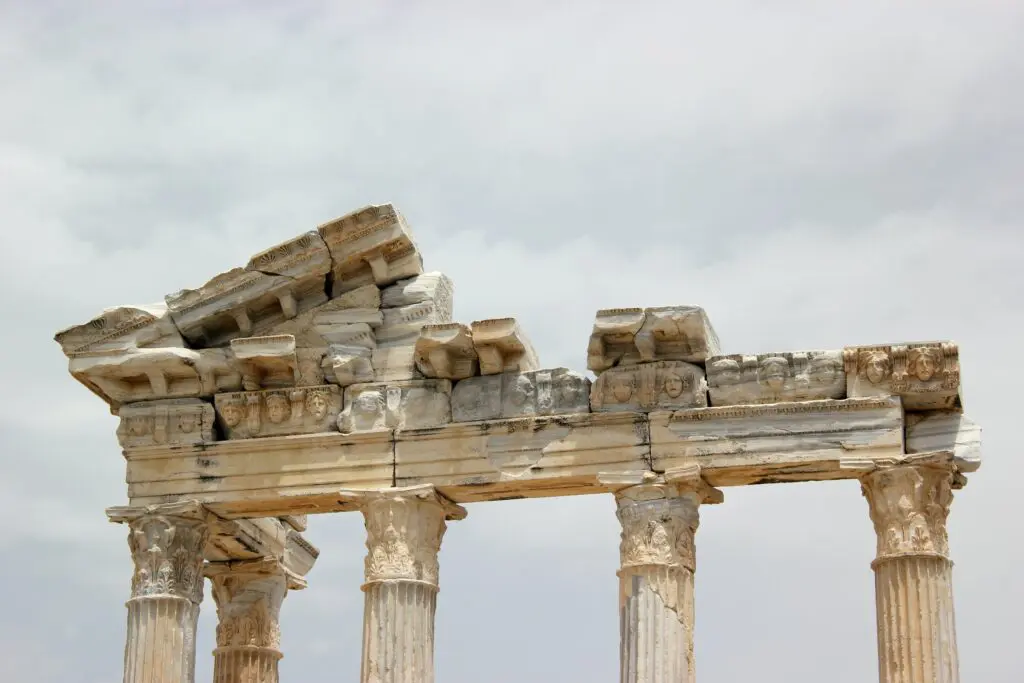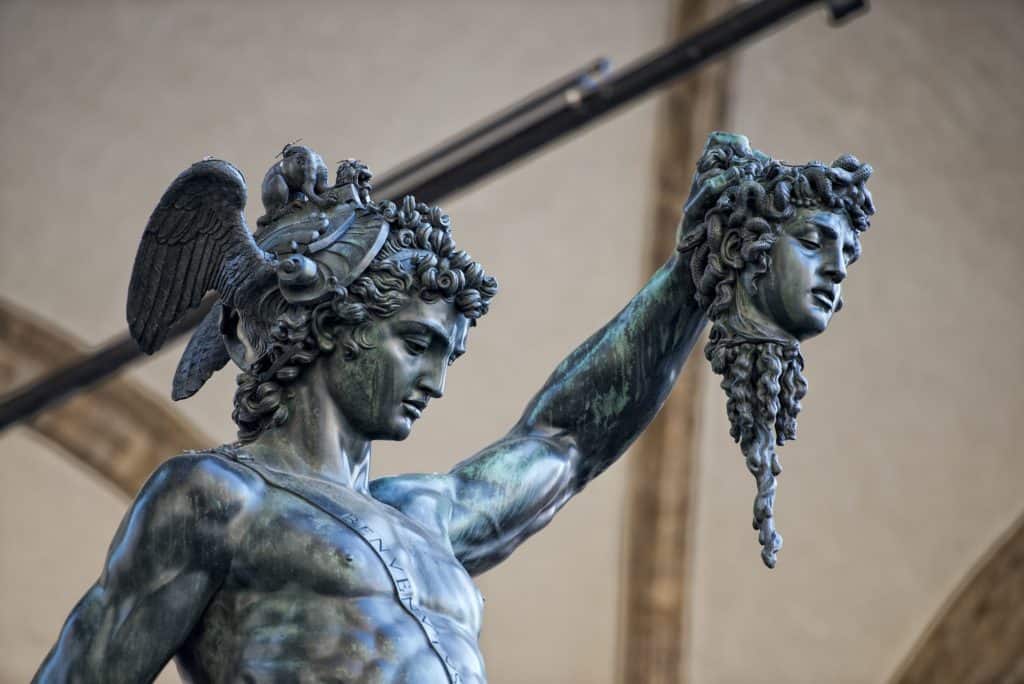Medusa Greek Myth: The Fascinating Story of the Snake-Haired Gorgon

Updated On: December 11, 2023 by Asmaa Alhashimy
Medusa is one of the most notable figures in Greek mythology. The Medusa Greek myth is a timeless tale that has captivated the imaginations of countless individuals throughout history. The story of Medusa is one of tragedy, power, and transformation.

While most people know Medusa as a terrifying monster, only a few know her thrilling, tragic backstory. Medusa’s story is a complex exploration of themes such as beauty, heroism, and the consequences of divine wrath, offering a fascinating glimpse into the moral and cultural values of ancient Greece.
In this article, we’re delving into the Greek myth of Medusa, exploring the details and intricacies that make her one of the most well-known figures in Greek mythology. Scroll down to read the article, or click on one of the highlighted sections below to skip ahead!
Table of Contents

The Greek Myth of Medusa: The Mortal Gorgon
To get into the Greek myth of Medusa, we must begin with Gorgon’s backstory. Greek mythology features a figure called a Gorgon, a monster-like character. According to ancient tradition, Gaea, the goddess-personification of the Earth in Greek mythology, created the Gorgon to help her sons fight the gods.
In Greek mythology, there were three monsters known as the Gorgons. They were the daughters of Typhon and Echidna, who were the father and mother of all monsters, respectively. The daughters were known as Stheno, Euryale, and Medusa, the most well-known among them.
Stheno and Euryale were traditionally thought to be immortal. However, their sister Medusa was not; she was beheaded by the demigod Perseus. Strangely, Medusa was also thought to be the daughter of Phorcys, the sea god, and Ceto, his sister-wife, rather than Echidna and Typhon.
Although there are many different types of Gorgons, the term most frequently refers to those three sisters who are said to have hair composed of living, poisonous snakes and frightening faces. Anyone who looked into their eyes would instantaneously be turned to stone.
Unlike the other two Gorgons, Medusa was occasionally depicted as both beautiful and terrifying. She was typically portrayed as a winged female figure with a snake-covered head of hair.
From Beautiful to a Monster: Why Was Medusa Cursed in the Greek Myth?

A common telling of the Medusa myth begins with Medusa being originally a beautiful lady but cursed by the goddess Athena, who turned her into a monster.
Athena was the goddess of war as well as wisdom. She was the progeny of the sky and weather god Zeus, who served as the chief deity of the pantheon. Being Zeus’ favourite child, Athena possessed enormous strength.
There had been a dispute between Poseidon and Athena about who should be the patron of the affluent Ancient Greek city of Athens. Poseidon was the mighty god of the sea (or water, in general), storms, and horses.
Poseidon was drawn to Medusa’s beauty and set about seducing her at Athena’s shrine. When Athena found out, she was enraged by what had occurred within her hallowed temple.
For some reason, Athena chose not to punish Poseidon for his deed. It might be because Poseidon was the potent god of the sea, meaning that Zeus was the only god with authority to punish him for his crime. It is also possible that Athena was jealous of Medusa’s beauty and men’s attraction to her.
Regardless of the exact reason, Athena directed her rage at Medusa. She transformed her into a hideous monster with snakes sprouting from her head and a deadly stare that would instantly turn anyone who gazes into her eyes into stone.

The Greek Myth of Medusa and Perseus
King Polydectes, the ruler of the Greek island of Seriphos, fell in love with Danaë, an Argive princess. Perseus, born to Zeus and Danaë, is a legendary figure and a great hero in Greek mythology. He was highly protective of his mother and stopped Polydectes from coming close to her.
Polydectes consequently devised a scheme to get him out of his way. He gave the orders for all the men in Seriphos to give Hippodamia, the queen of Pisa, the appropriate gifts under the pretence that he was about to marry her. Most of Polydectes’ friends brought him horses, but Perseus could not get any due to his poverty.
Perseus was willing to complete a difficult challenge, such as obtaining a Gorgon’s head. Trying to get rid of Perseus, Polydectes declared that all he wanted was the head of the Gorgon Medusa. He ordered Perseus to get it and warned him that he couldn’t return without it. Relieved that his mother would be left alone, Perseus agreed.
Perseus gained assistance from the gods because they were aware of this. Athena gave him a mirrored shield, Hephaestus, the god of fire, gave him a sword, and Hades, the god of the dead, gave him his Helm of Darkness.

In addition, Hermes, a son of Zeus, warned him of Medusa. He urged him to polish his shield so he could see her without looking directly at her. He also gave him his gold-winged boots so that he could fly securely to Medusa’s cave.
Aided by Athena and Hermes, Perseus eventually made it to the famous kingdom of the Gorgons. While she was asleep, Perseus cut off Medusa’s head with his sword. He managed to slay her by gazing at his reflection in the mirrored shield Athena gave him to avoid looking directly at Medusa and turning into stone.
Medusa was pregnant at the time, carrying Poseidon’s children. When Perseus beheaded her, Pegasus, a winged horse, and Chrysaor, a giant carrying a golden sword, sprang from her body.
Perseus and the Hideous Head
After killing her, Perseus made use of Medusa’s head as a weapon because it was still potent. He later gifted it to Athena, who deposited it in her shield.
In Perseus’s absence, Polydectes threatened and mistreated his mother, which forced her to escape and seek protection in a temple. When Perseus arrived back at Seriphos and found out, he was enraged. He then stormed into the throne room, where Polydectes and other nobles were meeting.

Polydectes couldn’t believe Perseus had completed the challenge and was shocked that he was still alive. Perseus claimed to have slain the Gorgon Medusa and displayed her severed head as proof. Once Polydectes and his nobles caught sight of the head, they were turned to stone.
According to the Latin author Hyginus, Polydectes plotted to murder Perseus because he feared his bravery, but Perseus arrived just in time to display Medusa’s head before him. After that, Perseus gave Dictys, Polydectes’s brother, the throne of Seriphos.
The Greek Myth of Perseus and Andromeda: Medusa’s Head Saves their Marriage
Andromeda was a beautiful princess, the daughter of Cepheus, the King of Ethiopia, and Cassiopeia, his wife. Cassiopeia offended the Nereids by boasting that her daughter was more beautiful than they were. In retaliation, Poseidon sent a sea monster to destroy Cepheus’ kingdom.
Because Andromeda’s sacrifice was the only thing that could appease the gods, she was tied to a rock and left for the monster to devour. Perseus, riding the winged horse Pegasus, flew by and met Andromeda. He slayed the monster and rescued her from being sacrificed. He also fell in love with her, and they were to get married.
However, things were not as easy. Andromeda’s uncle Phineus, to whom she had already been promised, was enraged. He attempted to claim her at the marriage ceremony. Hence, Perseus revealed the head of the Gorgon Medusa to Phineus and killed him by turning him to stone.

Further Powers of Medusa’s Head
It is said that Athena gave Heracles, son of Zeus, a lock of Medusa’s hair, which had the same abilities as the head. In order to defend the town of Tegea from attack, he gave it to Sterope, the daughter of Cepheus. The lock of the hair was meant to trigger a storm when it was visible, which forced the enemy to flee.
Moreover, Athena always carried Medusa’s head on her aegis whenever she fought in battle. Another story states that each drop of blood that dripped from Medusa’s head onto the Libyan plains instantly transformed into venomous snakes.
Furthermore, when Perseus met the Titan Atlas, he asked him for a place to rest, but the Titan refused. He knew that brute force alone couldn’t defeat the Titan. So, he took out the Gorgon’s head and displayed it before him, which caused the Titan to transform into a mountain.
What the Medusa Greek Myth Tells Us About Ancient Greece
The Greek myth of Medusa offers invaluable insights into the cultural values, beliefs, and societal norms of ancient Greece.
The Relationship with Beauty and Vanity
This myth reflects the Greeks’ complex relationship with concepts of beauty and monstrosity. Medusa, once a beautiful maiden, was transformed into a monstrous Gorgon with snakes for hair and a petrifying gaze as punishment for her vanity.

This transformation highlights the importance placed on physical appearance in Greek society, as well as the potential consequences of excessive pride.
An Insight into Greek Heroism
Furthermore, the story of Medusa also illustrates the prevailing heroic ideals of ancient Greece. Perseus, the hero tasked with defeating Medusa, embodies the archetypal Greek hero—a courageous and resourceful figure who overcomes formidable challenges
His quest to obtain Medusa’s head and use it as a weapon against his enemies represents the Greek emphasis on heroism and the conquest of seemingly insurmountable obstacles. The myth reinforces the notion that heroism was a physical feat and a moral one, as Perseus was guided by his sense of duty and honour throughout his journey.
Religious and Supernatural Beliefs
The Medusa Greek myth also provides insight into the religious and supernatural beliefs of ancient Greece. Medusa’s transformation into a Gorgon was a punishment from the gods, specifically from Athena, who turned her into a monster.
This underscores the Greeks’ belief in the direct influence of gods on human lives and the consequences of defying or angering them. The myth serves as a cautionary tale, reminding the ancient Greeks of the importance of piety and respect for the divine.
The Role of Women in Ancient Greece
Additionally, the narrative of Medusa highlights the role of women in ancient Greek society. While Medusa herself is depicted as a terrifying monster, her story also reveals the vulnerability of women in a patriarchal society.
She is victimized by Poseidon and then punished by Athena, both powerful male gods, which reflects the societal norms of the time. The myth suggests that women could be both objects of desire and objects of punishment, reinforcing the unequal power dynamics prevalent in ancient Greece.
Medusa Greek Myth: Still Alive Today
Interestingly, Medusa’s myth does not conclude with her death. Due to its implications and popularity, her name and likeness can be found being utilised in various aspects of life.
Works Based on the Medusa Greek Myth
The Greek myth of Medusa has inspired countless artists, writers, and creators throughout history. Its enduring appeal and rich symbolism have led to the creation of numerous famous works across various artistic mediums.
One of the most iconic and celebrated artistic representations of Medusa is the painting “Medusa” by the Italian Baroque artist Caravaggio. Created in the early 17th century, this masterpiece is a striking and gruesome portrayal of the Gorgon. The painting captures the moment of Medusa’s decapitation, with her grotesque head held aloft by Perseus.

In the realm of literature, the myth of Medusa has also been a prominent source of inspiration. Perhaps one of the most renowned works based on this myth is Ovid’s “Metamorphoses.” This epic poem, written in the first century CE, explores the transformation of Medusa and her sisters into Gorgons as a result of their encounter with the sea god Poseidon.
Moving into the realm of film, the Medusa myth has been adapted in various ways, one of the most notable being the 1981 movie “Clash of the Titans.” This fantasy adventure film follows the heroic journey of Perseus as he confronts Medusa and other mythical creatures on his quest to rescue Princess Andromeda.
Beyond traditional artistic mediums, the myth of Medusa has also found its way into contemporary art, literature, and even feminist discourse. Modern reinterpretations often explore themes of empowerment, reclaiming the narrative of Medusa as a symbol of strength and defiance rather than just a monstrous villain.
Other Ways the Greek Myth of Medusa is Used Today
- Many began using her likeness as a symbol of empowerment in modern culture in the twentieth century; notably, the fashion brand Versace uses Medusa as its logo.
- Several works of art feature Medusa as the subject, such as Leonardo da Vinci’s Medusa (oil on canvas).
- Some national symbols feature the head of Medusa, such as the flag and emblem of Sicily.
- Medusa is mentioned and honoured in some scientific names, including Discomedusae, a subclass of jellyfish, and Stauromedusae, the stalked jellyfish.

The Medusa Greek Myth is a Tale of Beauty, Heroism, and Culture
The Greek myth of Medusa is a captivating mirror reflecting the multifaceted nature of ancient Greek culture. This enduring narrative has provided us with profound insights into the values, beliefs, and societal norms of this ancient civilization.
The myth’s exploration of beauty and its consequences serves as a reminder of the Greeks’ dual perception of physical appearance, emphasizing the importance of balance and humility. The heroism of Perseus in his quest to conquer the monstrous Medusa epitomizes the Greek ideal of courage, resourcefulness, and moral fortitude in the face of adversity.
Furthermore, the story underscores the omnipresent influence of the gods in ancient Greek life, reminding us of their role as arbiters of fate and justice. Additionally, the portrayal of women in the Medusa Greek myth sheds light on the gender dynamics of ancient Greece and the roles and expectations placed upon women during that era.
The Greek myth of Medusa is more than just a captivating tale; it is a profound reflection of the values, beliefs, and intricacies of ancient Greek culture. Through its exploration of beauty, heroism, divine intervention, and gender roles, this myth allows us to better comprehend the intricacies of this ancient civilization.
If you enjoy mythology, check out some of our other blogs about ancient legends: Understanding Every Hera Symbol in Greek Mythology | Fairy Mythology: Facts, History, and Astonishing Characteristics | Scottish Mythology: Mystical Places to Explore in Scotland







First time I actually read any stories about Medusa. Very tragic story, but it seems her “head & locks of snake hair served certain folks quite well.